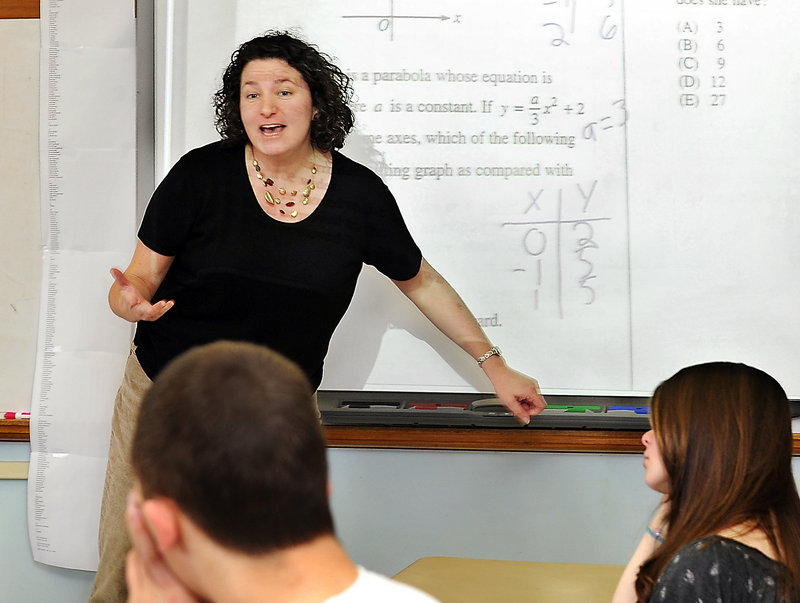Ian McInerney finds himself in a bit of a pressure cooker these days, like thousands of high school juniors across Maine and the nation.
In addition to carrying a full load of college-prep classes, lacrosse practices and other extracurricular activities, Ian is preparing to take the SAT on Saturday.
It’s his second run at the standardized college admissions test, which he took for the first time in January.
An A-student at Cape Elizabeth High School, Ian did well on the 3½-hour exam, which measures reading, writing and math skills. Still, he wants to do better, so he has taken an eight-week SAT preparation course to learn test-taking strategies.
The experience has boosted his confidence and his test-taking abilities.
“It’s easier to identify and answer problems,” he said. “You know what to look for.”
Taking a prep course, offered by high schools and by private agencies, is one way that students approach the SAT challenge, arguably one of the most stressful hurdles to adulthood.
Schools take various steps to support students as they prepare for the test, especially the SAT that’s given each May, which serves as the Maine high school assessment. Parents, guidance counselors and others do what they can to keep the whole experience in perspective.
“It is very stressful, and it is hugely important,” said Jeanne Crocker, principal of South Portland High School. “The truth is, the SAT either opens or closes doors. I want our students to be as prepared as possible, whether or not they consider it a gateway to the future.”
Like many high schools, South Portland High offers SAT prep classes as part of its curriculum. It’s an elective, semester-long course that provides test-taking strategies and practice time.
Jessica Kaplan, an English teacher at the high school, taught three sections of the course to juniors this year. About half of the sophomore class has signed up to take the course next year, filling five sections.
Kaplan said students who take her class show an average 170-point improvement in their SAT scores. Each section of the test is worth 800 points, for a maximum possible score of 2,400. Average scores nationwide are about 500 on each test, according to the College Board, which administers and scores the SAT. Top schools expect scores in the high 600s or better.
Juniors in Kaplan’s current classes took the course for various reasons. Some said they don’t do well on standardized tests and wanted to boost their chances of success. Others needed particular help with math or grammar, which many teachers don’t emphasize as they once did.
“This class helped to calm me down,” said Thomas Johnson. “Before, I thought the SAT was a god among tests. I’ve learned that it’s not as complicated as they made it seem.”
South Portland High uses an SAT curriculum provided free by Maine Prep, a test-prep company in Brunswick that offers courses throughout Maine. High schools in Lewiston, Monmouth, Sanford, Bridgton and North Anson also use the Maine Prep curriculum, said Jack Mahoney, president of Maine Prep.
Mahoney was a teacher and trainer for the Kaplan test prep company in New York City before he started Maine Prep in 2002, he said. One of several local test-prep providers, Maine Prep has prices ranging from $50 an hour, for classes with as many as 17 students, to $140 an hour, for private tutoring.
Mahoney said he doesn’t make promises about increasing students’ scores because there are so many factors involved, including a broad range of abilities.
“We’ve worked with students who have trouble writing a complete sentence, and we’ve had kids come to us with 740s and they get to 760s and their parents are ecstatic,” Mahoney said.
Ian McInerney took a Maine Prep course that was offered evenings at Cape Elizabeth High and taught by Kathryn Toppan, an English teacher at Deering High School in Portland.
“The key is to teach them strategies, but also to teach them how to recognize in the moment, when they’re taking the test, ‘Ah, this is when I use that strategy,’ ” said Toppan, who enjoys teaching math as much as English.
And please, don’t call them tricks, Toppan said. The term implies that the SAT is a tricky test, and she said it’s not. The strategies she offers are more like signposts, explaining the various types of questions that are usually on each test and how best to answer them.
Often, the tips she offers apply broadly as overall smart-learning strategies.
“Read aloud in your head,” Toppan advises Ian and his classmates. “Place the emphasis where the author intended, pronounce words carefully and pay attention to punctuation.”
Many high schools also incorporate SAT prep into the regular curriculum, introducing students to typical questions and demonstrating strategies to get the right answers as part of daily lessons. That’s the approach at Portland High School, which also offers elective SAT prep courses.
“It happens every day as part of regular classes,” said Mark MacLean, a Portland High guidance counselor who has been shepherding students through the SAT process for 25 years.
Teachers also use the SAT Question of the Day, offered through the College Board’s website, and direct students to various other online and community resources, MacLean said.
In recent years, the push for better SAT scores has intensified, especially for students who want to attend more selective schools, MacLean said. Some Portland High students with great SAT scores have been wait-listed this year because they have applied to colleges that receive hundreds of highly qualified applicants.
“If a college can accept 200 kids and they receive 2,000 applicants, they all have great scores,” MacLean said. “That’s why I tell kids to apply to a variety of schools, including one or two safety schools they know they will get into. There are plenty of good schools out there, including our state schools, where the pressure isn’t so great.”
While some colleges don’t require applicants to submit SAT scores, MacLean advises students to provide them anyway if the scores are good. In the absence of SAT scores, students must have stellar grades, a meaningful personal essay and strong letters of recommendation, as well as noteworthy involvement in sports, extracurricular activities and community service.
“If you don’t submit SAT scores, you better shine in some other area,” Mac-Lean said. “You want to distinguish yourself from all of the other applicants in some way.”
On Saturday, Ian McInerney hopes to push his overall SAT score from just under 2000 to better than 2000. He’d like to attend a small liberal arts college such as Colby, Bates or Middlebury. He’s thinking about being a physicist, an economist or a medical doctor, like his father.
His parents, Tom and Heidi McInerney, who is a writer, support Ian’s goals and want him to be successful in whatever he does, including the SAT. They hope colleges consider everything else their son has accomplished as an all-around athlete; member of the math, science and chess teams and the student and world affairs councils; and a tenor sax player in the Cape Elizabeth High band.
“His future doesn’t hinge on one test,” Tom McInerney said. “We keep telling ourselves that. You have to look at the whole picture.”
Staff Writer Kelley Bouchard can be contacted at 791-6328 or at:
kbouchard@pressherald.com
Send questions/comments to the editors.





Success. Please wait for the page to reload. If the page does not reload within 5 seconds, please refresh the page.
Enter your email and password to access comments.
Hi, to comment on stories you must . This profile is in addition to your subscription and website login.
Already have a commenting profile? .
Invalid username/password.
Please check your email to confirm and complete your registration.
Only subscribers are eligible to post comments. Please subscribe or login first for digital access. Here’s why.
Use the form below to reset your password. When you've submitted your account email, we will send an email with a reset code.